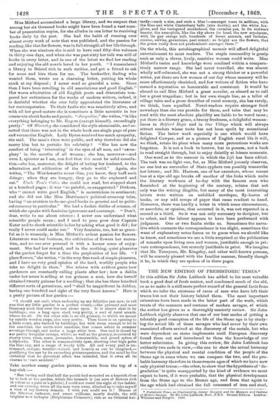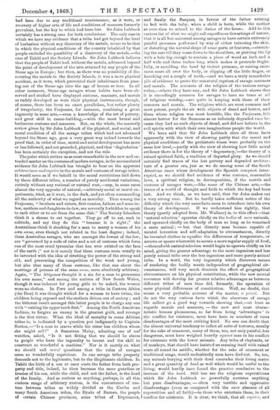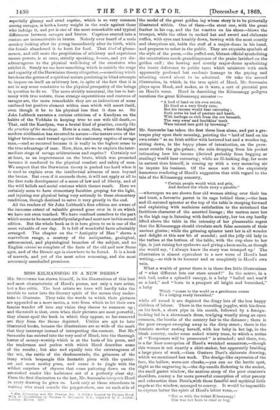THE NEW EDITION OF PREHISTORIC TIMES.* IN this edition Sir
John Lubbock has added to his most valuable book a good deal of fresh matter, and condensed much of the old, so as to make it a still more perfect record of the general facts from which we infer the existence of races of men who have left their traces but not their history behind them. The most important extensions have been made in the latter part of the work, which treats of the manners and-customs of modern savages, of which the author has given us a thoroughly masterly review. Sir John Lubbock rightly observes that one of our best modes of getting a tolerably good conception of the life of the Stone age is by study- ing the actual life of those savages who had never by their own unassisted efforts arrived at the discovery of the metals, but who were dependent on stone implements until European discovery found them out and introduced to them the knowledge of our better substitutes. In giving this review, Sir John Lubbock has evidently two ends in view,—the one to show the actual harmony between the physical and mental condition of the people of the Stone age in cases where we can compare the two, and the pro- bable harmony therefore in those remote ages of which we have now only physical traces ;—the other, to show that the hypothesis of de- gradation' is quite unsupported by the kind of evidence we must expect to have, if it were probable, that the physical development from the Stone age to the Bronze age, and from that again to the age which had obtained the full command of iron and steel, • Prehistoric Times, as Illustrated by Ancient Remains and the Manners and Customs of Modern Savages. By Sir John Lubbock, Bart., E.E.S. Second Edition. London: Williams and Norgate. 1369.
had been due to any traditional reminiscence, as it were, or recovery of higher arts of life and conditions of manners formerly prevalent, but the key to which had been lost. Sir John Lubbock certainly has a strong case for both conclusions. The only case in which we have any evidence that a tribe had got beyond the level of barbarians without any discovery of the metals, seems to be that in which the physical conditions of the country inhabited by that people excluded the possibility of a discovery of the metals,—the case of Tahiti and the Society Islands. Sir John Lubbock believes that the people of Tahiti had, without the metals, advanced beyond the point of development of the arts attained by any people of the Stone age in Europe ; but then, as there was no possibility of dis- covering the metals in the Society Islands, it was a mere physical accident, as it were, which prevented their inhabitants from pass- ing out of the Stone age into the age of bronze or iron. In all other instances, Stone image savages whose habits have been ob- served and studied have displayed customs, manners, and morals as rudely developed as were their physical instruments, though, of course, there has been no exact parallelism, but rather plenty of irregularity, the Feejeeans, for instance, combining a great ingenuity in some arts,—even a knowledge of the art of pottery, and great skill in canoe-building,—with the most brutal and barbarous customs and manners. But, on the whole, the masterly review given by Sir John Lubbock of the physical, and social, and moral condition of all the savage tribes which had not advanced beyond the Stone age, goes a very great way indeed towards the proof that, in order of time, moral and social development has more or less followed, and not preceded, physical, and that degradation' has been certainly the exception, and not the rule.
The point which strikes us as most remarkable in the new and ex- tended matter on the customs of modern savages, is the accumulated evidence Sir John Lubbock has brought to bear on the apparent arbitrariness and caprice in the morals and customs of savage tribes. It would seem as if we beheld in the moral restrictions laid down by these different tribes, a number of purely accidental variations, entirely without any rational or natural root,—nay, in some cases almost the very opposite of natural,—arbitrary social or moral ex- periments, tried, as it were, in the dark, and yet often commanding all the authority of what we regard as morality. Thus among the Feejeeans, "brothers and sisters, first cousins, fathers and sons-in- law, mothers and daughters-in-law, are severally forbidden to speak to each other or to eat from the same dish." The Society Islanders think it a shame to eat together. They go off to eat, each in solitude, and say they do this " because it is right ;" the Australians think it shocking for a man to marry a woman of his own name, even though not related in the least degree ; indeed, these Australian savages, who are amongst the lowest of the low, are "governed by a code of rules and a set of customs which form one of the most cruel tyrannies that has ever existed on the face of the earth ;" nor is it merely that these customs seem usually to be invented with the idea of rivetting the power of the strong and old, and preventing the competition of the weak and young, but also that many of these customs, like that one about the marriage of persons of the same name, seem absolutely arbitrary. Again, " The Abipones thought it a sin for a man to pronounce his own name," and among the natives of New South Wales, though it was indecent for young girls to be naked, the women wore no clothes. In Peru and among a tribe in Eastern Africa (the Ibos) it was thought wicked for a woman to have twins, the children being exposed and the mothers driven out of society ; and the bitterest insult amongst this latter people is to charge any one with " cutting his upper teeth first." Among the North American Indians, to forgive an enemy is the greatest guilt, and revenge is the first virtue. What the ideal of morality in some African tribes is, is indicated by a question put indignantly to Captain Burton,—"Is a man to starve while his sister has children whom she might sell?" A Sumatran Malay, admiring one of our" watches, asked, "Is it not fitting that we should be slaves to people who have the ingenuity to invent and the skill to construct so wonderful a machine." Nor is it merely on what we should call moral questions that the rules of savages seem so wonderfully capricious. In one savage tribe property descends not to the legitimate, but to the illegitimate children. In Tahiti the birth of a son at once ousts the father from both pro- perty and title, indeed, he then becomes the mere guardian or trustee of his son, while the child, and not the father, is the head of the family. And as curious as anything, perhaps, in all this curious range of arbitrary custom, is the concurrence of cus- tom between tribes as widely divided as the Caribs and many South American tribes, the Dyaks of Borneo, the people of certain Chinese provinces, some tribes of Esquimau', and finally the Basques, in favour of the father retiring to bed with the baby, when a child is born, while the mother at once rises to attend to the duties of the house. Add to this curious list of what we might call superfluous thwartings of nature, that it is all but universal among savages to have certain extremely painful processes performed by way of either tattooing the skin, or distorting the natural shape of some parts or features,—stretch- ing the ears till they come down to the shoulders, or piercing the lip with a hole big enough to contain a piece of wood an inch and a half wide and three inches long which makes it protrude fright- fully, or moulding the head by violent pressure, or raising enor- mous scars all over the body, or clipping off the little finger, or knocking out a couple of teeth,—and we have a truly remarkable pile of evidence to prove the unnatural caprices of savage manners and morals. The accounts of the religion of the various savage tribes,—where they have any, and Sir John Lubbock shows that it is exceedingly common for savages to have no trace at all of religious worship,—are quite in keeping with those of their manners and morals. The religions which are most common and most potent, people the air with objects of dread and horror, and those whose religion was most horrible, like the Feejeeans, felt sincere horror for the Samoans as an infinitely degraded race be- cause they had no such objects of dread, and did not believe in the evil spirits with which their own imaginations people the world.
We have said that Sir John Lubbock cites all these facts apparently with the view of showing partly that the moral and physical conditions of the prehistoric times were probably on the same low level,—partly with the view of showing how little moral evidence there is for the theory of degeneracy,'—the theory of a ruined spiritual faith, a tradition of departed glory. As we should certainly find traces of the lost pottery and degraded architec- ture of a greater era, just as we do among some of the South Alnerican races whose development the Spanish conquest inter- rupted, so we should find evidence of wise customs, reasonable laws, a spiritual religion, in decomposition, if the morals and customs of savages were,—like some of the Chinese arts,—the traces of a world of thought and faith to which the key had been lost. And we think, as we have said, that Sir John makes out a very strong case. But he hardly takes sufficient notice of the difficulty which the very same facts seem to introduce into his own theory of development. If we understand him rightly, that theory (partly adopted from Mr. Wallace) is, to this effect—that ' natural selection' operates chiefly on the bodies of mere animals, and operated chiefly on the body of man so long as he remained a mere animal ; — but that directly man became capable of mental invention and self-adaptation to circumstances, directly he invented clothes to equalize the differences of temperature, or arrows or spears wherewith to secure a more regular supply of food, —thenceforth natural selection would begin to operate chiefly on his mind, giving the greater advantage to the more ingenious and less purely animal tribe over the less ingenious and more purely animal tribe. In a word, the very ingenuity which discovers means of rendering the bodily wants independent of geographical cir- cumstances, will very much diminish the effect of geographical circumstances on his physical constitution, while the new mental resources will develop far greater relative advantages as between different tribes of men than did, formerly, the operation of mere physical differences of constitution. Well, no doubt, that seems a very probable account of the matter, a priori. But do not the very curious facts which the observers of savage life collect go a good way towards showing that,—at least as regards morals and manners, — the new and most charac- teristic human phenomena, so far from being 'advantages' in the conflict for existence, must have been in numbers of cases disadvantages of the most striking kind. No one can doubt that the almost universal tendency to inflict all sorts of tortures, usually for the sake of ornament, many of them, too, not only painful, but dangerous, must have weighed heavily against man in his conflict for existence with the lower animals. Any tribe of elephants, or of monkeys, that should have insisted on seaming itself with raised scars all round its middle, whether for the sake of ornament or traditional usage, would undoubtedly soon have died out. So, too, any animals burying with their dead comrades their living mates and a great quantity of food as well which would be useful to the living, would hardly have found the practice conducive to the increase of the herd. Still less are the religious superstitions which Sir John Lubbock so powerfully narrates anything but pure disadvantages, — often very terrible and oppressive disadvantages (even as compared with the mere absence of all superstition and all faith)—to those who entertain them, in their conflict for existence. It is clear, we think, that all caprice, and
especially gloomy and cruel caprice, which is so very common among savages, is both a heavy weight in the scale against those who indulge it, and yet is one of the most remarkable and typical differences between savages and brutes. Caprices erected into a custom are inconceivable in brutes. Nobody ever heard of a male monkey looking after its young immediately after its birth, while the female abandoned it to hunt for food. That kind of pheno- menon, and still more the propitiation of arbitrary and capricious unseen powers, is at once, strictly speaking, human, and yet dis- advantageous to the physical well-being of the creatures who exhibit it. Surely we see here something which is outside the scope and capacity of the Darwinian theory altogether,—something which betokens the germs of a spiritual nature persisting in blind attempts to impose on itself an arbitrary law, in spite of the fact that it is not in any sense conducive to the physical prosperity of the beings in question to do so. The more strictly unnatural, the less in har- mony with true nature, these strange superstitions and customs of savages are, the more remarkable they are as indications of some confused but positive element within man which will assert itself, even though it be to his physical loss that it does so. Sir
• John Lubbock narrates a curious criticism of a Kandyan on the habits of the Veddahs in keeping true to one wife till death,— That, said the Kandyan, was a brutal kind of practice, exactly like the practice of the monkeys. Here is a case, then, where the higher modern civilization has recurred to nature—the nature even of the higher brutes—and turned against the customary caprice of savage man,—and so recurred because it is really in the highest sense to the true advantage of man. How, then, are we to explain the inter- mediate stage of savage arbitrariness and caprice ? Certainly not at least, as an improvement on the brute, which was promoted because it conduced to the physical comfort and safety of man. We suspect that the Darwinian theory is pushed too hard when it is used to explain even the intellectual advance of man beyond the brutes. But even if it succeeds there, it will not apply at all to the first rude development of a sense of law and of liberty, and of the wild beliefs and social customs which thence result. Here we certainly seem to have elementary faculties groping for the light, and injuring our physical being very seriously in these elementary conditions, though destined to serve it very greatly in the end.
All the readers of Sir John Lubbock's first edition are aware of the immense extent of valuable ground gone over in it on which we have not even touched. We have confined ourselves to the part which seems to be most carefully enlarged and most new in this second edition. But the whole book as it is here given to us is one of the most valuable of our day. It is full of wonderful facts admirably arranged. The chapter on the " Antiquity of Man " shows a marvellous range, a mastery of the antiquarian, geological, astronomical, and physiological branches of the subject, and no English résumé so complete of the facts of the old and new Stone ages, and of the Bronze age is elsewhere to be found. It is a book of marvels, and yet of the most sober reasoning, and the most accurately marshalled premisses.




































 Previous page
Previous page